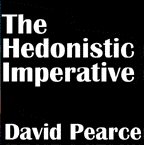







Negative Utilitarianism
"A vacuum is a hell of a lot better than someof the stuff nature replaces it with"
Tennessee Williams
2.7 Why Be Negative?
Ethical negative-utilitarianism is a value-system which challenges the moral symmetry of pleasure and pain. It doesn't question the value of enhancing the happiness of the already happy. Yet it attaches value in a distinctively moral sense of the term only to actions which tend to minimise or eliminate suffering. This is what matters above all else. The doctrine is counter-intuitive, not least insofar as it entails that from a purely ethical perspective it wouldn't matter if nothing at all had existed, or everything ceased to exist. Indeed, if the option were humanly available, the logic of the position morally obligates bringing the world to an end were this the only way to banish the suffering endemic to it.Happily, there is a much better way to rid the natural world of its endemic nastiness. This is to use biotechnology to eradicate aversive experience in all sentient life. Life-long happiness can be genetically pre-programmed. In the post-Darwinian Era, applied nanotechnology will extend hedonic engineering to all life-forms on the planet.
Following through the logical implications of this seemingly bizarre and perverse perspective is clearly not for the faint-hearted. Yet negative utilitarianism doesn't derive from self-hatred or some nihilistic death-wish. It stems instead from a deep sense of compassion at the sheer scale and intensity of suffering in the world. No amount of happiness or fun enjoyed by some organisms can notionally justify the indescribable horrors of Auschwitz. Nor can it outweigh the sporadic frightfulness of pain and despair that occurs every second of every day.
This manifesto was written, and will typically be read, in a relatively "euthymic" condition. So it isn't difficult to dissociate one's feelings from a mere printed catalogue of frightfulness. It's easy to convince oneself that things can't really be that bad, that the horror invoked is being overblown, that what is going on elsewhere in space-time is somehow less real than this here-and-now, or that the good in the world somehow offsets the bad. Yet however vividly one thinks one can imagine what agony, torture or suicidal despair must be like, the reality is inconceivably worse. Hazy images of Orwell's 'Room 101' barely hint at what I'm talking about. The force of 'inconceivably' is itself largely inconceivable here. For even if one's ancestral namesakes [aka "younger self"] underwent great pain, then the state-dependence of memory means, right this moment, that the utter dreadfulness of suffering is semantically, cognitively and emotionally inaccessible to the author and site visitors alike.
Thus HedWeb's tactical celebration of the incredible joys that lie ahead belies its underlying seriousness of purpose. Its seriousness is belied, too, by the rather shallow, amoral and one-dimensional well-being connoted by the word "hedonism". Should one have sacrificed purity of ethical intent in pursuit of a snappy title? Possibly not. For the sheer moral urgency of the Post-Darwinian strategy now in prospect cannot be overstated.
Paradise Engineering
The Good Drug Guide
The Pinprick Argument
Utilitarianism: glossary
Utilitarianism on the Web
Critique of Brave New World
Edmund Gurney: the first negative utilitarian (Derek Greatrex)
E-mail Dave
dave@hedweb.com